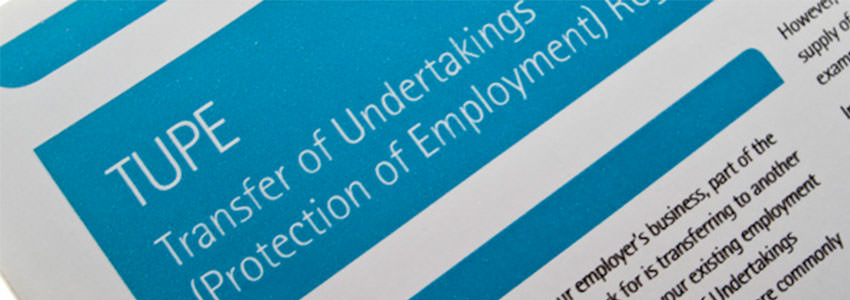TUPE & Business Sales
When the business you work for is being sold, there can be change and uncertainty in the air which can lead to a stressful time. Regulations are in place with a view to protecting employees and involving them in the process so that they are fully aware of what is going on. This includes who the buyer of a business is, any changes that will happen, and the timescales involved. The regulations are commonly known as “TUPE” (the Transfer of Undertakings (Protection of Employment) Regulations 2006).
TUPE will not apply in all situations, such as where there is a pure share sale taking place, i.e. where the business remains the same and only the shareholders change. However, even in situations like that, TUPE can be inadvertently brought into play where there is anything more than a simple share sale/ purchase.

The TUPE regulations are vastly complicated and far from easy to understand, often causing employers great difficulty in practice. We have provided more detail below to enable you to have an understanding of what is involved:
When Does TUPE Apply?
The TUPE regulations apply if a business or part of a business transfers to a new owner or merges with another business to make a brand new employer. The aim is to protect the terms and conditions of transferring employees.
There are two situations when the TUPE regulations will apply:
- Business Transfers: Where a business (or part of a business) transfers to a new owner, or merges with another business to make a brand new employer.
- Service Provision Changes: Where a contractor takes over activities from a client (i.e. outsourcing); a new contractor takes over activities from another contractor (i.e. re-assigning); or where a client takes over activities from a contractor (i.e. bringing work in-house).
What Does TUPE Do?
 If TUPE applies to a business sale, anyone employed by the seller (transferor) immediately before the transfer automatically transfers to the buyer (transferee) on their existing terms and conditions of employment. It will be automatically unfair to dismiss employees because of the transfer. Employees are entitled to object and refuse to transfer, in which case their employment will terminate, but they will not be entitled to any compensation.
If TUPE applies to a business sale, anyone employed by the seller (transferor) immediately before the transfer automatically transfers to the buyer (transferee) on their existing terms and conditions of employment. It will be automatically unfair to dismiss employees because of the transfer. Employees are entitled to object and refuse to transfer, in which case their employment will terminate, but they will not be entitled to any compensation.
What Must The Employer Do?
Bother the transferor and transferee must inform their employees of the proposed transfer and must also consult with them if they propose to make any changes to their terms and conditions of employment. Failure to do so can result in the Employment Tribunal awarding each employee up to 13 weeks’ gross pay.
How Can We Help You?
TUPE can appear (and is) complex, but we can assist you to ensure you understand how it applies to your situation.
If you need any assistance in this area, please contact a member of our team.

